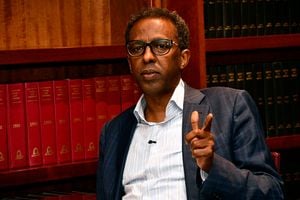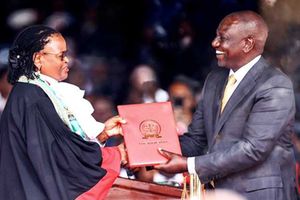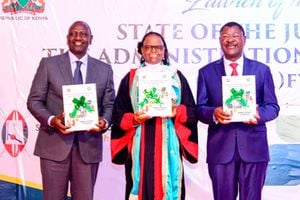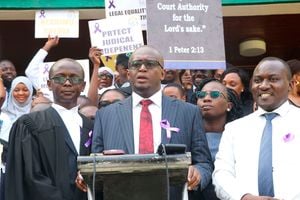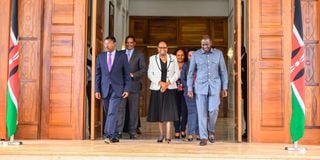
President William Ruto and Chief Justice Martha Koome after a dilalogue meeting that brought together the leadership of the Judiciary, Legislature and Executive at State House Nairobi.
President William Ruto yesterday held talks with the heads of the two other arms of government and said he will not protect any member of his administration accused of corruption.
He also challenged Chief Justice Martha Koome to demonstrate similar commitment in the Judiciary even as it emerged that a dossier on alleged corruption in courts featured in the talks.
The talks, which also had National Assembly Speaker Moses Wetang’ula, and which lasted for about four-and half hours, saw the three agree that graft remains “an existential threat to the nation” and had permeated the three arms of government.
A source who attended the meeting told the Nation in confidence that President Ruto was categorical that there should be no sacred cows in the fight against corruption.
“There are no sacred cows in the Executive. There shouldn’t be in the Judiciary or the Legislature,” he reportedly said.
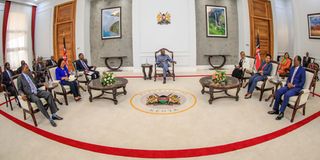
President William Ruto when he met Chief Justice Martha Koome and National Assembly Speaker Moses Wetang’ula.
The meeting comes a week after CJ Koome, as the chairperson of the Judicial Service Commission (JSC) asked for an audience with the President over his continued attacks on the Judiciary for alleged corruption.
The source said the President softened his stance on threats to disobey court orders, saying he will abide by the decisions.
However, he expressed his concerns that some of the orders issued were obtained through corruption yet they had the effect of crippling the projects initiated by his Kenya Kwanza administration.
Sources indicated that CJ Koome was given a dossier allegedly capturing clandestine meetings between some politicians and some lawyers whose agenda was to sabotage his administration. To make his case, the President is said to have opted to “declassify” some security briefs.
“The disclosures regarding highly classified materials were to introduce the CJ to the intricate web of politics to which she is a stranger. It was aimed, too, at revealing to her that the President is not speaking from his own imagination,” the source said.
President is said to have also expressed concerns that there were orders against the government obtained from courts outside Nairobi yet injunctions should only be sourced from within the jurisdiction of cited conflict.
The Judiciary is said to have committed itself to approach the issue of government litigation more consciously but without limiting citizens’ rights to litigate against the government.
It was said that it agreed to explore ways of allocating government related cases to a bench and institute mechanisms to attend to graft concerns among its officers
Further, it was agreed that the Judiciary should lead from the front in dealing with graft cases seriously and discourage mischief that deliberately sees such cases drag on for ages.
Among the projects stopped through court orders are the Social Health Insurance Fund—the order was lifted temporarily by the Court of Appeal—affordable housing and the privatisation of 11 parastatals.
Justice Koome is said to have admitted that there was graft in the Judiciary but disagreed with the manner the President was approaching the matter.
The Chief Justice, who is also the president of the Supreme Court, had last week said the JSC cannot act on blanket statements, and will only act on evidence lodged before it.
“Such complaints must be lodged and processed in the manner prescribed by the constitution. The commission will only act on the basis of evidence and not on blanket statements or allegations that have not been substantiated,” said Justice Koome in a statement.
The source said the discussions were cordial and the three leaders expressed themselves freely.
A statement issued after the meeting stated that the leaders had agreed to develop regulations and come up with legislative proposals to boost the fight against corruption.
“The Executive, Judiciary and Legislature agreed to develop policies, guidelines, regulations and legislative proposals to fight graft and enhance institutional accountability to the people,” a State House statement issued after the meeting stated.
The leaders tasked each arm of the government to individually develop policies, guidelines, regulations and legislative proposals to improve service delivery.
“Within 30 days, each arm of government will submit the proposals made to a forum of the National Council of the Administration of Justice (NCAJ) convened by Her Ladyship the Chief Justice,” the statement read.
It added that the forum will provide a roadmap for the immediate, medium-term and long-term measures to be undertaken.
Also present during the meeting from the Executive were Attorney-General Justin Muturi, Interior cabinet Secretary Kithure Kindiki and Solicitor-General Shadrack Mose. From the Judiciary were Deputy Chief Justice Philomena Mwilu and acting Chief Registrar of the Judiciary Paul Ndemo.
The meeting was also attended by the Council of Governors chairperson Anne Waiguru.
The Nation established that Mr Wetang’ula was included in the talks at the last minute to avoid potentially bad publicity that a meeting between the President and the CJ only would have attracted. Already there were growing opposition, led by the Law Society of Kenya, against it.
Also Read: Why the judiciary is on trial, again
The reason for inviting the Speaker, we gathered, was to project the meeting as one involving the three arms of government.
The leaders also agreed to increase the Judiciary's budgetary allocation to enable the recruitment of an additional 25 judges of the High Court and 11 more for the Court of Appeal.
Further, the Judiciary will be facilitated to conclude its vehicle leasing programme to support the transport needs of judicial officials.
“The Executive, Legislature and Judiciary commit to perform their functions in a manner that respects, promotes and enhances the rule of law, institutional independence and respect for court decisions,” the statement added.
Mr Muturi described the meeting as cordial, adding that it centred on the fight against corruption and the accountability of the three arms of government.
“We cannot avoid the fact that sovereignty belongs to the people and can only be exercised in accordance with the constitution. The respective powers of the Executive, Parliament and Judiciary, as stipulated in the constitution, are derived from the people,” he said. He added that whatever each arm of government does, it must be accountable to the people.
“The meeting therefore, emphasised the centrality of the people in the three arms of the government,” he said.
Following the meeting, opposition leader Raila Odinga castigated CJ Koome for agreeing to meet the President, saying she had given in to the President. He added that the CJ’s decision to dialogue with the Executive was an affront to the independence of the Judiciary.
Mr Odinga, who was in Lamu County for the launch of an ODM membership recruitment drive, was accompanied by the party’s Deputy Leader Wycliffe Oparanya, Mombasa Governor Abdulswamad Nassir and other leaders from the Coast region.
The CJ was also criticised by Siaya Governor James Orengo, who said Justice Koome had “succumbed to pressure” from the Executive by agreeing to the meeting.
“It is very rare in a democratic nation where the Chief Justice is intimidated to the extent that she prays for a meeting with the President or Prime Minister of that nation,” Mr Orengo said.
Speaking at Lundha Secondary School in Gem yesterday where he launched bursary distribution to some 18,081 needy learners, Mr Orengo said the constitution created the Judiciary as a co-equal arm of government.
“The Executive is not superior to the Judiciary and the Judiciary is not superior to the Executive. I challenge the Kenya Kwanza government that if you truly have any information, if it is not mere propaganda or mere politics, why is it that from the last two to three weeks we have not had any report of significance going to the Judicial Service Commission on the corruption allegations?” said the governor, pointing out that his sentiments do not mean that the judges are not corrupt.
“We have fought against corruption, we have brought institutions to make sure that we have a Judiciary that is free from corruption and a pathway towards disciplining the judges,” he said, adding that the President is not above the law.
“As a judge, you must be as clean as Caesar’s wife. Justice (Willy) Mutunga never went for a private meeting with a President to try and talk about allegations made against judges,” Mr Orengo said.
Additional reporting by Justus Ochieng.


